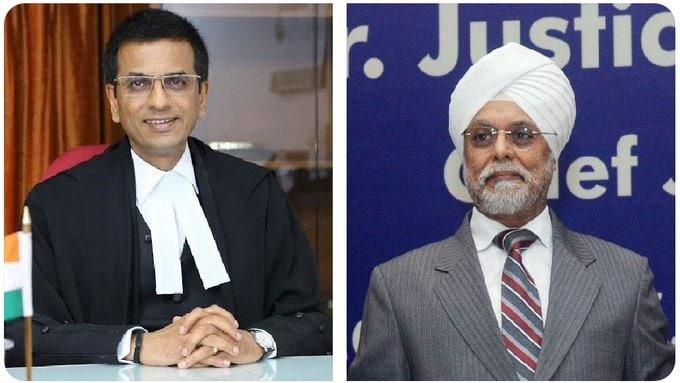Ex-Top Judges Sound Caution on ‘One Nation, One Election’ Bill
Two of the country’s most respected former Chief Justices have raised crucial red flags over the proposed One Nation, One Election system. In discussions with a key parliamentary panel, DY Chandrachud and JS Khehar stressed the need to avoid giving the Election Commission unrivaled control. Their insights hint at deeper concerns behind the move to synchronize national and state elections under one legislative framework.
While the government pushes forward with its plan to unify electoral timelines, the reaction from some of India’s highest former legal authorities may make lawmakers pause. What’s at stake isn’t just logistical efficiency — it’s the very balance guiding our democratic process.
What the Former Chief Justices Said
In a Joint Parliamentary Committee (JPC) meeting on the Constitution (One Hundred and Twenty-Ninth Amendment) Bill, 2024 and the Union Territories Laws (Amendment) Bill, 2024, DY Chandrachud and JS Khehar argued for an “oversight mechanism” on how elections are run under the proposed model. According to sources, the justices maintained that the Election Commission should not be given “unbridled powers“. Instead, they proposed checks and balances to avoid any concentration of authority.
“They said this (five-year term) should not be curtailed under any circumstances,” a source close to the deliberations shared.
The duo emphasized that an elected government’s full five-year term is essential for meaningful policy implementation and stability — two ingredients central to consistent governance.
Timeline of Key Committee Meetings
- Early 2024 – JPC begins examining the amendment bills.
- April 2024 – Former Chief Justices UU Lalit and Ranjan Gogoi interact with the panel.
- May 2024 – Eighth panel meeting takes place; Chandrachud and Khehar share warnings.
The committee, headed by BJP MP PP Chaudhary, has been consulting legal minds to gauge the feasibility and fairness of overhauling India’s electoral calendar.
Concerns About the Election Commission’s Role
This is not the first time voices have pushed back against giving too much clout to the Election Commission. Earlier, former Chief Justice Ranjan Gogoi also challenged the scale of power proposed for the poll body. These arguments center on an essential principle: accountability.
Without a robust system of legislative or judicial oversight, critics fear unchecked powers could erode transparency. There’s also the question of how the EC will adapt to the vast management requirements of simultaneous elections without a slip-up. Can it handle that scale efficiently and fairly? That’s still uncertain.
Parliament’s Position So Far
Despite the criticism, BJP MP PP Chaudhary remains firm on the bill’s progress. He addressed concerns raised by former judges, stating:
“As far as the provision of the Election Commission is concerned, if we feel that the bill needs amendment, we will amend it,” he said, adding, “We will send our report to the Parliament only after making amendments in the national interest.”
Chaudhary has also highlighted that this system of synchronized elections is intended to serve long-term goals. “One Nation, One Election system is necessary for nation-building,” he commented.
Opposition’s Take
Many opposition parties remain wary of the bill. Their primary concern? That such synchronization could shake the “basic structure” of the Constitution. They argue it may weaken the federal nature of Indian democracy by centralizing power under one administrative umbrella, making state legislature timelines hostage to Parliament’s term.
Still, jurists who have testified before the JPC mostly disagree with this argument. The Constitution, they maintain, doesn’t prohibit national and state polls from occurring together — technically, it’s a valid legislative change if backed by procedural support across states and both houses of Parliament.
Community Response Still Evolving
Among the public, responses are split. Some voters welcome the idea of reducing the frequency of elections — no more seemingly endless vote seasons. Others are skeptical, feeling the change could silence smaller or regional voices that don’t align with central agendas.
Key public concerns:
- Will local issues be ignored during clubbed elections?
- What happens if a state government collapses early?
- Can this system be executed fairly across such a large democracy?
These are valid questions. While experts continue to debate the route forward, much of the public is left wondering how this might really work in practice.
What’s Next for the Bill?
After eight sittings and several key testimonies, the JPC is expected to present its recommendations soon. Whether they’ll integrate the judicial suggestions remains to be seen. If implemented, the change would require major adjustments across electoral logistics, governance timelines, and possibly judicial interpretation.
Mr. Chaudhary has noted that, should legal amendments be needed, the committee is open to “tweaks” to preserve constitutional integrity. Given the magnitude of overhauling India’s 70-year-old electoral framework, those tweaks might not be small.
And even then, successful implementation would depend on state governments aligning their assembly terms with Parliament — a task requiring cooperation across political lines that may not be readily available.
Final Thoughts
One Nation, One Election could shape India’s political future — that’s hardly in dispute. But such a shift demands clarity, consensus, and constitutional caution. Former Chief Justices Chandrachud and Khehar make one thing clear: democracy operates best when power is shared, not concentrated. Whether lawmakers heed this advice will decide not only the bill’s fate — but possibly that of future elections for generations to come.

